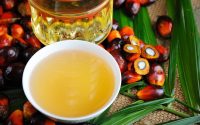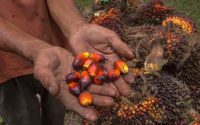PALM OIL AND HUMAN RIGHTS: WHAT DO YOU NEED TO KNOW
The rapid expansion of the palm oil industry has led to excessive deforestation, destruction of tropical rain forests, and endangered species of wild flora and fauna. The Amnesty International survey revealed that the labor infringement problem caused by this is equally shocking.
About five palm oil spot key information:
- Half of your daily necessities contain palm oil
About 50 % of the products in the supermarket contain palm oil or raw materials made from palm oil. Because of its low price and wide range of uses, the market has a strong demand for palm oil. This oil extracted from palm fruit is made into cooking oil for cooking and processed foods such as chocolate, biscuits or cereals. It can also be made into raw materials such as glycerin, and detergents, as well as toothpaste, soap, shower gel, shampoo and other beauty products contain glycerin.
- Indonesia is the world’s most large palm oil producing country
Indonesia has an annual output of 35 million tons of palm oil , accounting for 45% of global supply. About 3 million people work in the palm oil industry in the country, at least one-third of the world’s palm oil industry. Indonesia has a strong labour law. However, weak law enforcement has led companies to commit systematic human rights violations against workers in palm plantations without being held accountable.
- The regions with the greatest demand for palm oil are India , the EU and China.
Global demand for palm oil has grown rapidly, with only 61 million tons of palm oil consumed in 2015 alone. In 1990, this figure was less than 15 million. The regions with the largest imports of palm oil are India, the European Union, and China . In 2016, the three places imported a total of 20 million tons of palm oil.
- The world’s largest palm oil producer suspected of violating labor rights
Singapore-based agribusiness Wilmar International ( Wilmar ) controls the world’s more than 43% of palm oil trading , company earnings in 2015 amounted to $ 38.78 billion. Workers working in the plantations of the company and its suppliers have worked hard to support their families but earned only a modest salary. In some extreme cases, they earn only $2.50 a day. Wilmar claims that its total in Indonesia and Malaysia in the industry 6 more than thousand employees .
- Some of the world’s largest company by means of these violations Mu Lee
Amnesty International has tracked the flow of palm oil from Indonesia’s plantations to nine multinational companies. The nine companies have a total turnover of $325 billion.
Eight of the nine companies are members of major international institutions working to make palm oil “sustainable”. In fact, more than 2,000 companies are members of the Roundtable Sustainability Palm Oil. The agency was established in 2004 to rectify the palm oil industry that has caused many environmental pollution scandals. However, Amnesty International’s report reveals that even if palm oil contained in a product is certified “sustainable” by the agency, the product may still involve human rights violations.
Amnesty International has tracked the flow of palm oil from nine investigated plantations to nine multinational food and commodity companies. A list of products containing palm oil products is then sent to these companies to confirm whether the palm oil contained in these products originates from Wilmar International and Indonesia.
Colgate-Palmolive Colgate Palmol
Colgate’s oral care, personal care and home care products all contain palm oil derivatives. Colgate has also confirmed that palm oil comes from a refinery associated with plantations surveyed by Amnesty International, but does not disclose which products are made from such palm oil derivatives.
Colgate said that whether to continue to withdraw oil from Wilmar International depends on whether the company can systematically resolve the human rights violations detailed in its public report. Colgate requires suppliers at all levels to comply with its “non-exploitation policy”.
Nestlé Nestle
Nestlé has confirmed that Kit Kat chocolate, lion caramel crispy biscuit chocolate, American cuisine, and crisp cereals contain palm oil. However, Nestlé did not disclose to Amnesty International which of the products contained palm oil from six Fengyi International refineries built in Indonesia.
Unilever Unilever
Unilever’s AXE/Lynx Body Fragrance, Ben and Jerry’s Ice Cream, Bedley Edible Oil, Birds Eye Ice Cream, Cup a Soup Instant Soup, Dove Beauty, Knorr Soup Bag And products such as vaseline beauty products contain palm oil or palm oil.
Unilever confirmed that Wilmar International’s industry in Indonesia is indeed one of its major palm oil suppliers. Palm oil supplied by Wilmar International is widely used by Unilever in food, home care and personal care products, but Unilever has not disclosed which of these products contain palm oil from Wilmar International’s Indonesian industry.
Proctor & Gamble (P&G) Procter & Gamble
Procter & Gamble’s Llano fabric softener, Bilang washing powder, Head & Shoulders shampoo, Pantene Pro-V shampoo, cover girl sexy shimmer eyeshadow and other products contain palm oil. P&G confirmed that it obtained palm oil from Wilmar International and Indonesia, but said that only a small amount of palm oil derivatives came from Fengyi. Procter & Gamble is unwilling to confirm which products containing palm oil are made from the Indonesian industry of Wilmar International.
Kellogg’s Kellogg
Kellogg’s CrunchyNut food line, Pop Tarts biscuits, Nutri-Grain cereals and other products contain palm oil. However, the company denied that the palm oil in these products came from Wilmar International.
Kellogg confirmed that palm oil contained in the potato chips produced and sold in mainland China comes from Wilmar International and a refinery associated with the plantations surveyed by Amnesty International. China’s Pinto chips are produced by a joint venture between Kellogg and Wilmar International.
Reckitt Benckiser Reckitt Benckiser
Li Jieshi’s Claires cleansing products, Wei Ting hair removal products and designer detergents contain palm oil. Li Jie confirmed that Wilmar International is one of the top five palm oil suppliers, and the company obtained raw materials made from palm oil from a refinery associated with the plantation surveyed by Amnesty International.
Palm oil from Wilmar International was used to make soap when it was used by Li Jie. This soap is sold all over the world, and a small amount of this palm oil is used to make cooking oil sold in the United States. Li Jieshi said that the origin of such soaps includes Indonesia, China, the United Arab Emirates, Egypt, South Africa, Nigeria, Sri Lanka, Bangladesh and India.
AFAMSA
AFAMSA manufactures animal feed, candles, soaps and detergents from palm oil derivatives.
AFAMSA confirmed that Wilmar International supplies palm oil and a range of derivatives. Amnesty International has tracked that palm oil has flowed into AFAMSA from a refinery associated with the plantations surveyed by Amnesty International.
Archer Daniels Midland Company (ADM) Archer Daniels Midland Company
Archer Daniels Midland uses palm oil to produce a range of cooking oils and other foods such as cooking oil and margarine.
The company confirmed that palm oil supplied to Wilmar International was used for industrial and food purposes. The factory that supplies palm oil to the company is picking up the plantations surveyed by Amnesty International. Olenex, a joint venture between Archer Daniels Midland and Wilmar International, sells refined vegetable oils and animal and vegetable oils to the European Economic Area and Switzerland. Archer Daniels Midland is a minority shareholder of Wilmar International (holding 23% of its shares). The company is reluctant to disclose which products contain palm oil from Wilmar International.
Elevance
Elevance Renewable Sciences confirmed that the company’s joint venture with Wilmar International has located processing equipment in Gresik, Indonesia, and is located in a larger facility belonging to Wilmar International. The joint venture also obtained palm oil from Wilmar International. Amnesty International also found that the joint venture and another company based in Indonesia to export raw materials made from palm oil to Elevance in the United States. However, Elevance did not disclose which products contain such raw materials made from palm oil.



